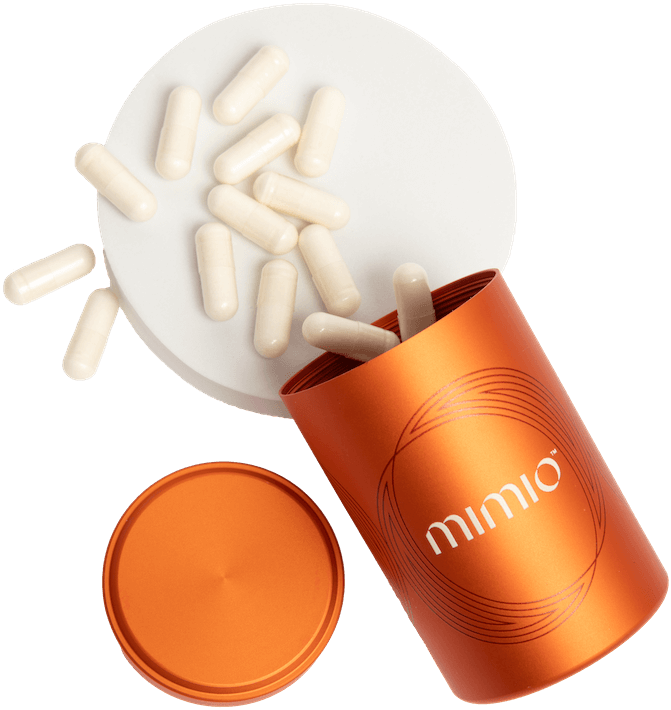Longevity Isn’t Just for Diabetics Anymore
Metformin might not sound sexy. It’s not a new-age adaptogen or a mysterious herb plucked from the Himalayas. It’s a decades-old drug originally developed to treat type 2 diabetes. And yet, this humble pharmaceutical has become a surprising star in the world of biohacking and longevity research—especially among people without diabetes.
Why? Because mounting evidence suggests that metformin might do more than manage blood sugar—it might slow aging itself.
If you’ve heard about people taking metformin for longevity despite not having diabetes, you’re not alone. But is it safe? Is it effective? And are there better, more natural alternatives?
Let’s break down the science, weigh the pros and cons, and explore how biomimetic approaches like Mimio Biomimetic Cell Care could offer a smarter path to aging well.
Metformin: A Quick Primer
First introduced in the 1950s, metformin is the most prescribed drug for type 2 diabetes in the world. It helps lower blood glucose levels, improves insulin sensitivity, and reduces glucose production in the liver¹.
But researchers soon noticed something interesting: people with diabetes who were taking metformin were often living longer than those not on the drug—even longer than healthy individuals without diabetes². This raised a powerful question:
Could metformin benefit non-diabetics, too?
What the Science Says: Metformin and Longevity
Metformin isn’t an anti-aging drug per se, but it does influence several biological pathways associated with aging:
1. Activates AMPK (AMP-activated protein kinase)
AMPK is the body’s cellular fuel gauge. When activated, it helps cells conserve energy, enhances autophagy, and reduces systemic inflammation³.
2. Suppresses mTOR (mechanistic Target of Rapamycin)
mTOR is a key regulator of growth. Chronic activation is linked to aging and cancer, while its suppression mimics the benefits of calorie restriction—a known longevity enhancer⁴.
3. Enhances Mitochondrial Function
Metformin supports mitochondrial efficiency, reducing reactive oxygen species (ROS) that contribute to cellular damage and aging⁵.
4. Supports Autophagy
This is the body’s internal cleanup system, breaking down and recycling damaged cellular components. Metformin can enhance this process, especially when combined with fasting or exercise⁶.
5. Alters Gut Microbiota
The gut-brain axis plays a big role in overall health and aging. Metformin shifts gut bacteria in a way that may improve metabolic balance and immune function⁷.
What About Non-Diabetics?
This is where things get both exciting and controversial.
A growing number of biohackers, researchers, and health-conscious individuals are turning to metformin—not to manage disease, but to prevent it. The idea? Use it prophylactically to activate longevity pathways before chronic conditions appear.
Some even refer to it as “a poor man’s rapamycin”—a more accessible, well-tolerated option for those seeking anti-aging benefits.
The TAME Trial: Targeting Aging with Metformin
The biggest and boldest initiative in this space is the TAME (Targeting Aging with Metformin) trial, led by Dr. Nir Barzilai⁸. This ambitious clinical study aims to demonstrate that metformin can delay the onset of multiple age-related diseases in healthy older adults.
If successful, it could be the first step toward recognizing aging as a treatable condition. But until those results are in, taking metformin for longevity—especially as a non-diabetic—remains off-label.
Risks and Side Effects of Metformin in Healthy Individuals
While metformin is generally well tolerated, it's not without drawbacks, particularly for non-diabetics:
-
Gastrointestinal issues: Nausea, bloating, and GI-issues are common early on.
-
Vitamin B12 deficiency: Long-term use can interfere with B12 absorption, potentially leading to fatigue and nerve issues.
-
Exercise blunting: Some studies show metformin may blunt the benefits of resistance training.
-
Unknown long-term effects: There’s still a lot we don’t know about chronic use in healthy people.
Plus, you’ll need a prescription. Not all doctors are on board with prescribing it to those without a medical indication.
Is There a Better Way? Meet Mimio: The Fasting Mimetic
If metformin works by mimicking the effects of caloric restriction, then it’s part of a broader category of substances known as mimetics. And Mimio Biomimetic Cell Care is one of the most promising options in that category (and you don’t need a prescription or to worry about the unknowns associated with Metformin).
Why Metformin Mimics Fasting – But Isn’t Fasting
Metformin and fasting may share similar benefits, but they aren’t the same. While both activate stress response pathways in cells (a concept known as hormesis), the context and intensity of the biological signals differ.
|
Pathway or Process |
Metformin |
36-Hour Fasting |
|
AMPK Activation |
Moderate |
Strong and sustained |
|
Ketone Production |
None |
High |
|
Glucose Depletion |
Minimal (liver-targeted) |
System-wide |
|
Autophagy Induction |
Mild to Moderate |
High |
|
Growth Hormone Increase |
No |
Yes (especially after 24 hours) |
|
Nutrient Replenishment |
Not addressed |
Yes, post-fast nutritional rebound |
Fasting is a full-system reset. Metformin? More like a nudge. Mimio builds on this concept by providing a gentle, but effective biomimetic signal that taps into these same benefits, without requiring metabolic stress.
Instead of relying on prescription drugs, Mimio was scientifically formulated to mimic the regenerative effects of a 36-hour fast—naturally, by tapping into your body’s typical functions and kicking them into overdrive. Mimio activates the same key pathways as metformin (AMPK, mTOR inhibition, autophagy), but without the side effects or prescription barrier.
Think of Mimio as a nutritional signal to your body, telling it:
“Hey, it’s time to clean up, repair, and regenerate—just like we would during a fast.”
How Mimio Compares to Metformin
|
Feature |
Metformin |
Mimio Biomimetic Cell Care |
|
Prescription Required |
Yes |
No |
|
Primary Use |
Type 2 diabetes |
Longevity and cellular repair |
|
Side Effects |
GI issues, B12 depletion |
Minimal, food-derived formulation |
|
AMPK Activation |
Yes |
Yes |
|
mTOR Suppression |
Yes |
Yes |
|
Enhances Autophagy |
Indirectly |
Directly |
|
Supports Fasting Metabolism |
Yes |
Yes |
|
Natural Ingredients |
No |
Yes |
|
Sustainable Packaging |
No |
100% compostable or recyclable |
Who Might Want to Avoid Metformin?
Even with its longevity promise, metformin isn't suitable for everyone. You may want to think twice if:
-
You’re young and healthy with no metabolic issues
-
You’re engaged in strength training and don’t want to blunt muscle gains⁹
-
You have or are at risk for B12 deficiency
-
You’re looking for natural or plant-based alternatives
-
You prefer solutions that align with holistic or lifestyle-based health
For these individuals, metformin for longevity non diabetics might not be worth the trade-offs.
The Natural Alternative: Biomimetic Longevity Without the Rx
Mimio’s approach to aging isn’t about adding a pharmaceutical to your daily stack. It’s about activating what your body is already capable of—regenerating, cleaning, adapting.
Inspired by fasting biology and created through rigorous research at UC Davis, Mimio offers a new paradigm for healthy aging:
-
No fasting required
-
No drugs needed
-
No systemic side effects
You get the benefits of a 36-hour fast—like enhanced autophagy, improved mitochondrial function, and reduced inflammation—through a convenient, daily supplement.
Mimio Is for You If...
-
You're curious about longevity science but wary of pharmaceuticals and prescriptions
-
You want a sustainable, long-term solution for cellular health
-
You’re already fasting and want to boost those effects
-
You can’t fast due to lifestyle or medical reasons
-
You want to age actively, not passively
Longevity shouldn’t come with a warning label. Mimio makes it easier—and safer—to tap into your body’s natural regenerative pathways.
Longevity Tools Comparison: Metformin vs Mimio vs Fasting
Still deciding which longevity strategy suits your body and lifestyle? Here’s how metformin, Mimio, and fasting stack up across key longevity mechanisms.
|
Feature/Effect |
Metformin |
Mimio |
36-Hour Fasting |
|
Requires Prescription |
✅ |
❌ |
❌ |
|
AMPK Activation |
✅ |
✅ |
✅✅ |
|
Autophagy Boost |
✅ |
✅ |
✅✅✅ |
|
Natural Ingredients |
❌ |
✅ |
✅ |
|
Lifestyle Compatible |
Medium |
High |
Low to Medium |
|
Side Effects |
Possible |
Minimal |
Hunger, fatigue |
|
Exercise Synergy |
⚠️ (may blunt gains) |
✅ |
✅✅ |
|
Cognitive Boost |
Mild |
Moderate |
High (ketone-driven) |
|
Sustainable Packaging |
❌ |
✅ |
N/A |
This breakdown highlights that Mimio sits at the intersection of convenience, science, and natural effectiveness—without the limitations of prescription drugs or the challenges of fasting.
Wrapping Up: Do You Need Metformin for Longevity?
The research is exciting. The theory is sound. But the truth is, you don’t need a diabetes drug to activate your longevity genes.
Metformin has opened the door to a world where aging is not just inevitable—it’s modifiable. But that doesn’t mean it's the best tool for everyone, especially non-diabetics.
If you’re looking for a natural, effective, science-backed way to stimulate the same longevity pathways—without prescriptions, side effects, or trade-offs—Mimio may be the smarter choice.
It’s time to rethink aging. Not with fear, but with strategy.
Take Charge of Your Health Today!
Explore Mimio Biomimetic Cell Care and discover how your body can regenerate from within—naturally.
References
-
Rena, G., et al. (2017). Molecular mechanism of action of metformin: old or new insights? Diabetologia, 60(9), 1577–1585.
-
Bannister, C. A., et al. (2014). Can people with type 2 diabetes live longer than those without? A comparison of mortality in people initiated with metformin or sulphonylurea monotherapy and matched non-diabetic controls. Diabetes, Obesity and Metabolism, 16(11), 1165–1173.
-
Hardie, D. G. (2011). AMP-activated protein kinase: An energy sensor that regulates all aspects of cell function. Genes & Development, 25(18), 1895–1908.
-
Johnson, S. C., et al. (2013). mTOR is a key modulator of ageing and age-related disease. Nature, 493(7432), 338–345.
-
Vial, G., et al. (2019). The role of mitochondria in the mechanism of action of metformin. Frontiers in Endocrinology, 10, 294.
-
Madeo, F., et al. (2019). Caloric restriction mimetics against age-associated disease: targets, mechanisms, and therapeutic potential. Cell Metabolism, 29(3), 592–610.
-
Wu, H., et al. (2017). Metformin alters the gut microbiome of individuals with treatment-naive type 2 diabetes, contributing to the therapeutic effects of the drug. Nature Medicine, 23(7), 850–858.
-
Barzilai, N., et al. (2016). Metformin as a tool to target aging. Cell Metabolism, 23(6), 1060–1065.
Walrand, S., et al. (2020). Metformin blunts muscle hypertrophy in response to progressive resistance exercise training in older adults: A randomized, double-blind, placebo-controlled trial. Aging Cell, 19(6), e13142.



